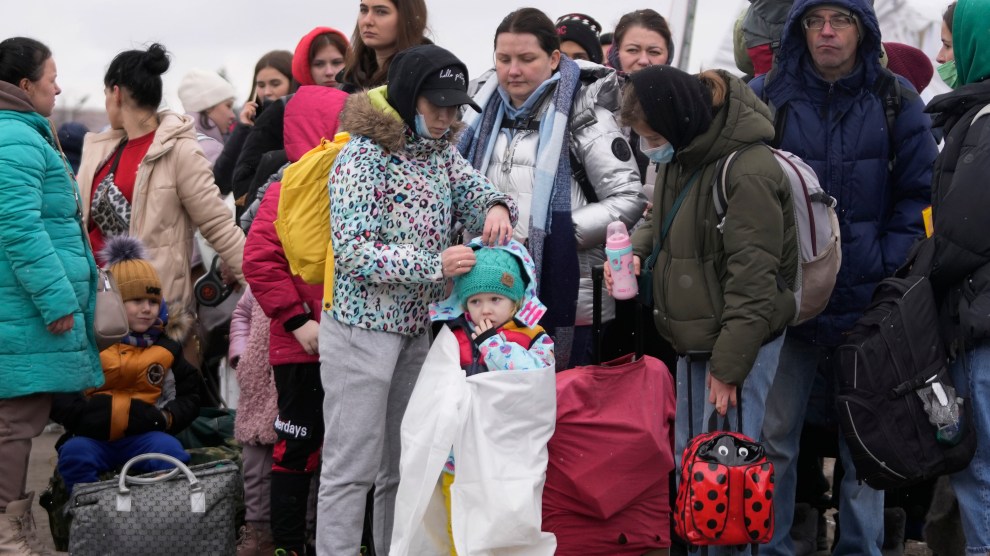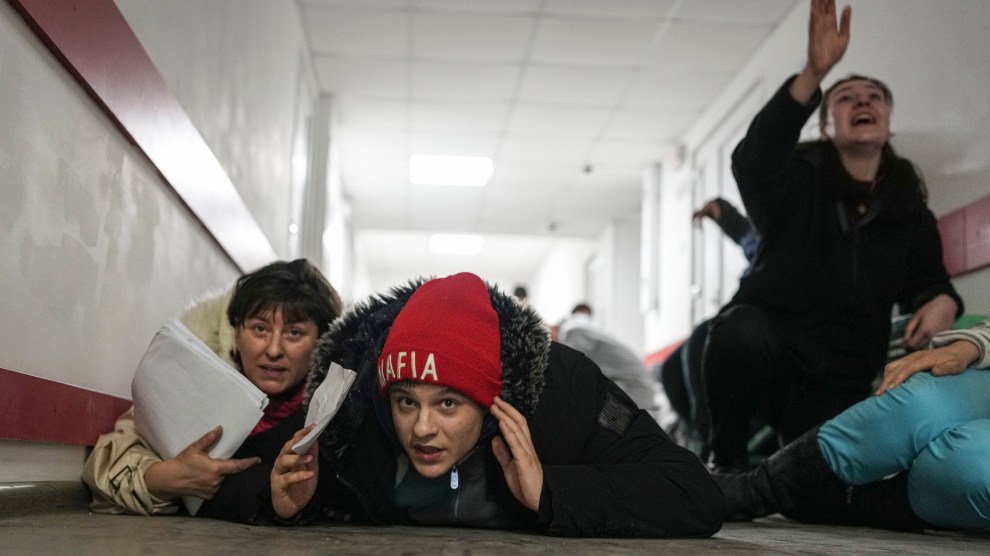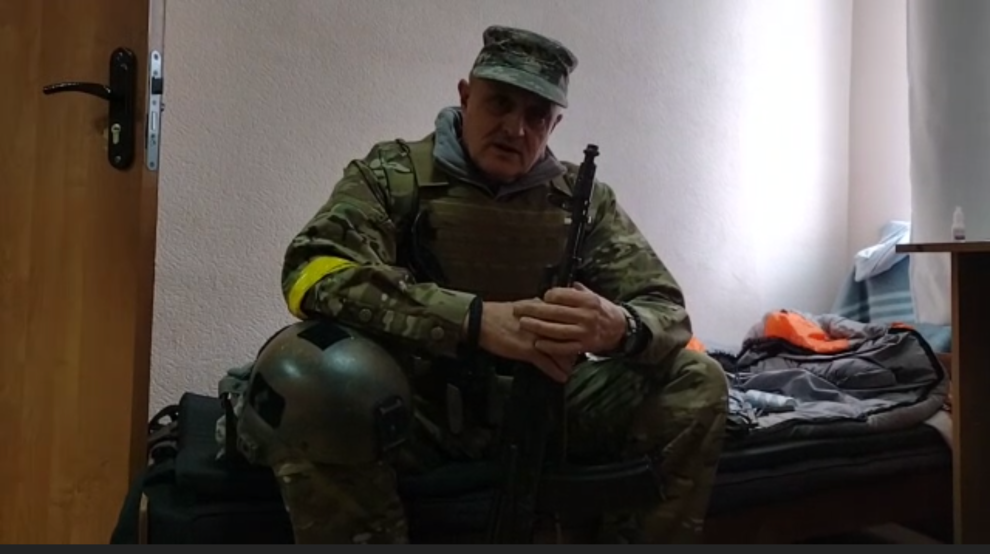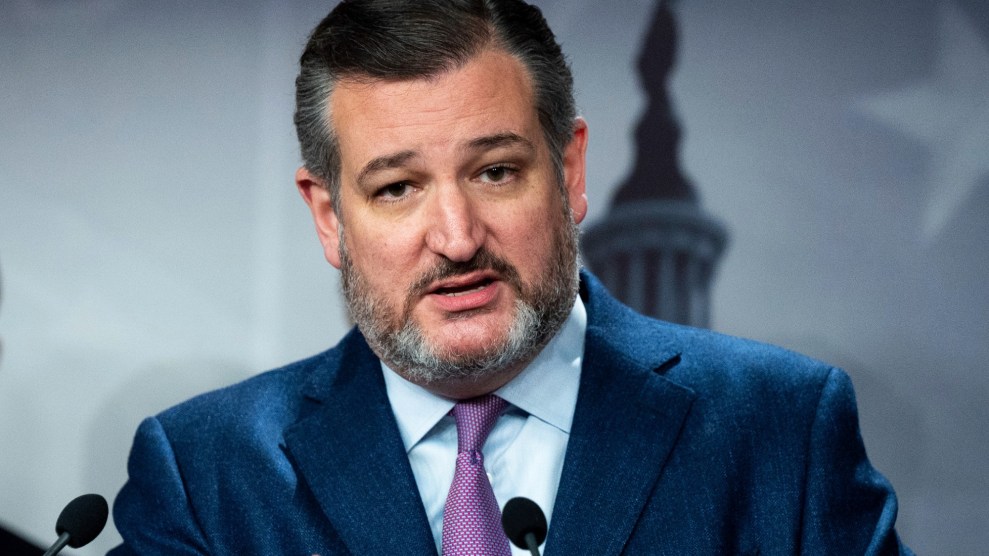As Vladimir Putin’s illegal invasion kills Ukrainian civilians and raises fear of nuclear war, Donald Trump and his minions have repeatedly insisted that this war would have never happened had Trump won a second term. That, says former ambassador John Bolton, is bunk. In an interview with Mother Jones this week, Bolton, who was Trump’s national security adviser from 2018 to 2019, discussed Trump’s lack of concern for Ukraine during his White House tenure; Trump’s odd relationship with Putin; Bolton’s decision not to testify during the first Trump impeachment; a big secret about Trump that Bolton is not at liberty to fully reveal; and more.
Bolton noted that when he served in the White House, Trump paid “very little attention” to Ukraine “until the summer of 2019 when [Trump] realized that he could have the possibility of holding up the obligation and delivery of substantial security assistance [to Ukraine] in an effort to get access to the Hillary Clinton computer server that he felt was in Ukraine, finding out about Hunter Biden’s income in Ukraine, and all of these things in this spaghetti bowl of conspiracy theories. That was the first time he really focused” on Ukraine. By this point, Putin had for years been backing pro-Russian separatists in eastern Ukraine who were fighting government troops and Ukrainian militias. Yet Trump was more concerned with the nutty and unfounded notion pushed by right-wing conspiracists that the Democratic National Committee computer servers hacked by Russian cyber-operatives in 2016 were somehow whisked away to Ukraine to cover-up purported Ukrainian intervention in the election. According to Bolton, Trump really believed this Alex Jones-ish crap.
Trump’s fixation on this bizarre conspiracy theory and his ravenous desire to dig up dirt on Joe and Hunter Biden in Ukraine, Bolton recalled, “made it hard for the rest of us who were concerned about the instability that we saw in Ukraine and eastern Europe generally because of the Russian threat to get anything much done on it.” He noted that during the NATO summit in the summer of 2018, Trump was close to announcing a US withdrawal from the military alliance. This disrupted the entire meeting and prevented a full discussion of one of the major topics on the agenda: Ukraine.
When Trump looked at Ukraine, he only saw servers, Bidens, and schemes. This, Bolton said, rendered it difficult “to get any focused presidential-level attention to the issue” of Ukraine’s security and its conflict with Russia. Moreover, Bolton recounted, he couldn’t even follow what Trump was saying about Ukraine and all this supposed skullduggery: “I had any number of conversations with Trump, with [Rudy] Giuliani, with others about these theories that frankly I never could understand. I couldn’t get to the bottom of them. They didn’t connect with one another. They were based on some guy who told some other guy something that the President was determined to track down… And you couldn’t really discuss the subject of Ukraine or the threat posed by Russia…without very quickly the conversation completely diverting to these other subjects.”
Bolton said that he believes Trump intended to pull out of NATO and blow up the alliance, if he were reelected: “Trump, I think, fundamentally didn’t like the NATO alliance.” Trump had pushed the NATO countries to increase their military spending “not to strengthen NATO but because he fundamentally believed nobody would do it.”
One key question about Trump that has never been fully explained is his infatuation with Putin. In 2013, he tweeted that he wanted Putin to be his “best friend.” He praised the thug-leader throughout the 2016 campaign. He recently hailed Putin’s violent and murderous moves in Ukraine as “genius.” Did Bolton have any insight into Trump’s crush on Putin? “It went along, in a sense, with his infatuation with [Chinese President] Xi Jinping, with Recep Erdogan of Turkey, with Kim Jong-Un of North Korea… I’m not a shrink so I can’t give you the clinical reason. But I think Trump thought of himself as a big guy and he liked talking to other big guys and they talk about the big-guy things that they did, and he kind of admired them.”
During his tenure as national security adviser, Bolton never had a significant conversation with Trump about Putin. I asked if he had felt compelled to talk to Trump about Putin’s attack on the 2016 US elections and to try to make Trump come to terms with that. Bolton said that he and “many other people” indeed attempted to raise this subject with Trump, but to no avail: “You can’t make Donald Trump come to terms with reality if he doesn’t want to. But he was told it repeatedly. It just didn’t fit with what he wanted to hear.”
One of the big revelations of Bolton’s 2020 book, The Room Where It Happened, was that during a G-20 meeting in 2019, Xi, in a one-on-one conversation with Trump, said China was constructing concentration camps for the Uighurs, and Trump said Xi should go ahead with it. “We were told [about the conversation later],” Bolton said to me. “It was something that made it effectively impossible to do anything about the situation for the Uighurs.” Well, what was it like to work with a boss who gave a green light to genocide? I asked, noting that there were no resignations from the White House over this. Bolton replied that he had taken the job “knowing, having heard an awful lot about Donald Trump” but “nonetheless believed that like every other president the weight of his responsibilities and the gravity of the issues he would have to deal with would discipline him. And like every other president, he would address them responsibly. And in a sense, my book is a long story about how I was wrong.”
Bolton spilled a lot of Trump tea in his book. But he is still sitting on at least one big revelation. In his memoir, he recounted that at that G-20 gathering, during a bilateral session between Trump and Xi, Trump pointed out that China, due to its influence on the US economy, had the capability to affect American political campaigns and “stunningly” pleaded with Xi to help him win reelection. Bolton, though, did not provide details of this request. “I would print Trump’s exact words,” he wrote in the book, “but the government’s prepublication review process has decided otherwise.”
Could Bolton now reveal more about this? “I didn’t say in the book exactly what I wanted to say,” he told me. “As part of the prepublication review, this was intensely discussed, and I think it was an area where the then-national security adviser and/or the White House counsel’s office made it very hard to get as close as I wanted to get to what he actually said. And some people have said since the book was published, ‘Well, I was in the room and that’s not what Trump said.’ Let me just say I agree it wasn’t what Trump said because I couldn’t put in exactly what he said. And until the day comes when I can get clearance for it, I’ll just have to leave it with what’s in the book, which is substantively correct, although they are not the exact words.”
So is this a bombshell about Trump that could still explode? The Trump White House, Bolton remarked, “knew exactly how sensitive that point was.”
Bolton famously refused to testify during the first Trump impeachment—even though, as his book later demonstrated, he had witnessed Trump withhold security assistance from Ukraine to pressure President Volodymyr Zelensky to cook up dirt on Joe Biden and to confirm the loony server conspiracy theory. After all that has happened since—Trump’s attempt to overturn the 2020 election, the January 6 riot, the invasion of Ukraine—did Bolton regret not testifying? Not at all, he said: “I don’t have any regrets because I think [the Democrats] bungled this whole thing. The question to ask—it’s a very complicated subject—but the question to ask was, did the effort to impeach Trump solely on Ukraine under the time schedule the Democrats were following, which is before their presidential primary season heats up, ultimately do what they said they wanted to do, which is, if they can’t convict Trump, at least constrain and deter him? Or did the fact that he was acquitted ultimately embolden him? And I think it emboldened him. And I think it may have been politically satisfying for the Democrats, but I think it simply said to Trump, ‘I beat them. I can beat them again.'”
Yet what if Bolton had testified? Might that have changed the outcome? “I don’t think so,” he said. “The Republicans had bought the White House argument that even if everything that Trump’s accusers said was true, that what he did had not risen to the level of an impeachable offense… That’s why they voted against passing a resolution in the Senate to have me come and testify.” Instead, Bolton told his tale in his book six months later.
As for the current nightmare in Ukraine, Bolton fears Putin and the Russian military cannot back down: “Now the credibility and the reputation of the Russian military is damaged so badly that they’ve got to do something in their minds to try and regain their image. Otherwise, nobody will give them credence anywhere, near or abroad. I’m afraid what’s going to happen is just a continuing grinding-down of the people in Ukraine until at some point, maybe not for weeks or even months, people agree to bring it to a halt.” Long known as a hawk’s hawk, Bolton did not call for direct US or NATO military engagement or participation in a no-fly zone over Ukraine. His recommendation was to ramp up the current response: “We need to torque up sanctions in a big way. I’d go after the Russian energy sector. If you don’t apply the pressure now, I don’t know what anybody’s saving it for.”













